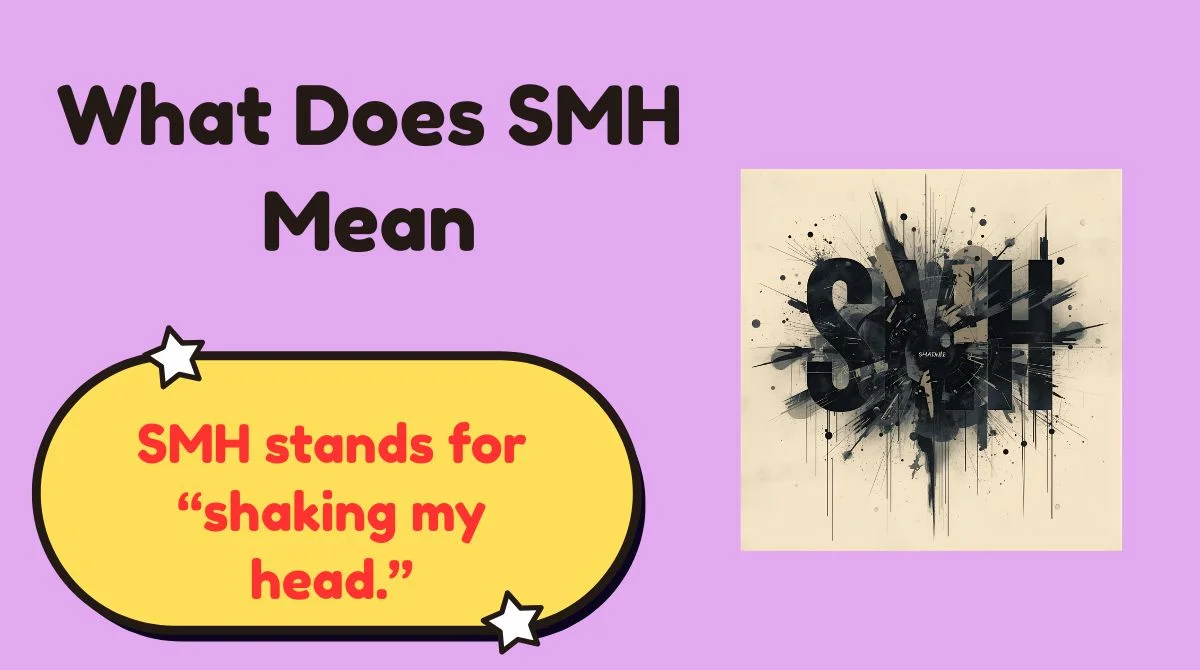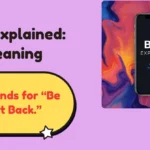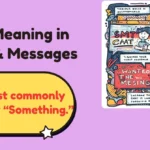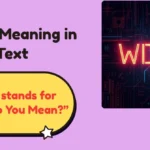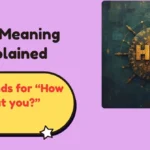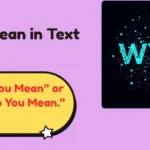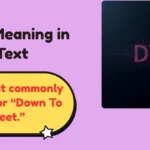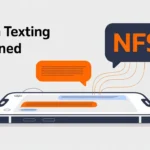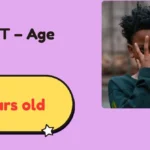Digital slang changes faster than we can scroll. You’ve probably seen “SMH” appear in texts, tweets, or TikTok comments — and maybe even used it yourself.
\But have you ever stopped to ask what SMH really means, where it came from, and why people still use it today?
This guide dives deep into the meaning of SMH, its nuances, origins, and modern uses across different platforms. You’ll also learn alternatives, tone tips, and mistakes to avoid — everything you need to communicate smarter in 2025’s online world.
What Does “SMH” Mean in Text or Online Chat?
SMH stands for “shaking my head.” It’s a quick way to express disappointment, disbelief, or mild frustration — without saying a word.
You’ll usually see it used when someone reacts to something ridiculous or silly:
- “He really thought the Earth was flat again… SMH.”
- “Forgot my keys inside. SMH at myself.”
- “The traffic today… SMH.”
📘 Quick Breakdown
| Term | Meaning | Common Use | Tone |
|---|---|---|---|
| SMH | Shaking My Head | To show disbelief or disappointment | Disapproving, sarcastic, or amused |
| LOL | Laugh Out Loud | Express amusement | Playful |
| TBH | To Be Honest | To share a candid opinion | Neutral to sincere |
In short, SMH doesn’t just say ‘I disagree’ — it shows emotion. It’s digital body language.
The True Nuance Behind SMH
The magic of SMH lies in its tone flexibility. The same letters can feel sarcastic, funny, or disappointed — depending on how they’re used.
🗣️ Tone Shifts by Context
| Example | Emotion Conveyed |
|---|---|
| “SMH.” | Quiet frustration or disappointment |
| “smh😂” | Lighthearted disbelief or irony |
| “smh bro…” | Casual annoyance or disbelief |
| “Smh, that’s wild.” | Mild amusement or resignation |
Notice how punctuation and emojis alter the mood. A period can make SMH sound serious, while 😂 softens it.
Pro tip: When using SMH, always match the tone of the conversation. Overusing it in sensitive chats might sound dismissive.
Origins and Evolution of SMH
SMH wasn’t born in the meme era — it’s older than you might think.
The abbreviation first appeared in online forums and early chatrooms like BlackPlanet and AOL Instant Messenger in the early 2000s. It became widely recognized when Urban Dictionary added it in 2004, defining it simply as “shaking my head.”
From there, SMH evolved:
- 2005–2010: Used in text messages and MySpace captions.
- 2011–2015: Spread through Twitter and meme culture.
- 2016–2020: Adopted into GIFs and reaction memes.
- 2021–2025: Common across TikTok, Reddit, and Instagram, often paired with humor or sarcasm.
Fun fact: SMH became so embedded in digital culture that it’s now recognized in dictionaries as standard slang.
When and Where to Use SMH
SMH is best used in casual conversations or light social contexts. It helps convey emotion without sounding overly dramatic.
💬 Common Scenarios
-
Texting friends:
“Forgot my wallet again… SMH.” -
Reacting to online news:
“Politicians arguing instead of solving problems — SMH.” -
Commenting on social media:
“This challenge trend again? SMH 😩.”
🚫 When to Be Careful
Avoid using SMH in formal or professional messages. Imagine sending your boss, “SMH at this report.” That might not land well.
Use SMH when tone can be interpreted easily — otherwise, clarity beats coolness.
Reading the Tone: How SMH Can Mean Different Things
Tone determines whether SMH feels funny or rude.
Here’s how it shifts in real life:
Case Study:
Alex texts his friend: “You’re late again.”Response A: “SMH.” (Annoyed)
Response B: “SMH 😂 You and your timing!” (Playful)
Same acronym, totally different energy.
Emoji Tone Chart
| Version | Tone | Meaning |
|---|---|---|
| smh😂 | Light humor | Laughing at a funny mistake |
| smh😔 | Empathy or shared disappointment | “I get you.” |
| smh🤦♀️ | Frustration or disbelief | “How did that happen?” |
| smh🙄 | Sarcasm | “Of course… figures.” |
Using emojis helps soften tone, especially when texting someone new or discussing touchy topics.
The Psychology Behind Using SMH
Ever wondered why people love abbreviations like SMH instead of typing full sentences?
🧠 It’s About Emotional Efficiency
Humans crave speed and simplicity online. SMH condenses a full emotional response — the head shake, sigh, or disbelief — into three letters.
Psychologists call this “nonverbal digital communication” — expressing gestures through symbols or text. It’s why emojis and acronyms feel so natural.
Think of SMH as the digital eye-roll. It’s not aggressive, just expressive.
Why Understanding SMH Matters in Modern Communication
Digital language is more emotional than formal. Knowing what SMH really conveys helps you:
- Avoid miscommunication
- Read online tone accurately
- Express emotion efficiently
🧩 Real-World Example
A social media manager once replied to a customer complaint with “SMH.”
The intention: “I’m disappointed this happened to you.”
The perception: “I’m judging you.”
Result: Negative backlash and apology post.
Moral? Slang isn’t one-size-fits-all. Context always rules.
Smart Alternatives and Replies to SMH (With Use Cases)
Let’s be honest — you can’t use SMH everywhere. Sometimes, you need a smarter or softer version.
🔹 Professional or Polite Alternatives
| Alternative | When to Use | Example |
|---|---|---|
| “That’s unfortunate.” | Work emails or polite replies | “That’s unfortunate. Let’s fix it.” |
| “That’s disappointing.” | Customer or colleague tone | “That’s disappointing to hear.” |
| “I understand your frustration.” | Empathetic tone | “I understand your frustration — we’ll resolve this.” |
🔹 Casual and Friendly Alternatives
| Alternative | Mood | Example |
|---|---|---|
| “Bruh…” | Light disbelief | “Bruh… you did what?” |
| “Wow, really?” | Shocked or amused | “Wow, really? You forgot again?” |
| “I can’t even.” | Sarcastic disbelief | “I can’t even with this traffic 😂.” |
🔹 Sarcastic or Humorous Replies
| Alternative | Tone | Example |
|---|---|---|
| “Classic.” | Playful sarcasm | “Classic, you again forgot your keys.” |
| “Can’t relate.” | Ironic | “You love pineapple on pizza? Can’t relate 😅.” |
| “My head just left the chat.” | Meme humor | “He did that? My head just left the chat.” |
How to Choose the Right Alternative
Choosing between SMH or an alternative depends on your audience, platform, and mood.
🧭 Quick Guide
| Factor | Best Choice | Example |
|---|---|---|
| Audience | Friends → SMH / Work → Polite phrase | “SMH, that’s crazy” vs. “That’s unfortunate.” |
| Platform | TikTok → Humor / LinkedIn → Professional | “SMH 😂” vs. “That’s disappointing.” |
| Emotional Intensity | Mild → SMH / Strong → Longer expression | “SMH” vs. “I can’t believe that happened.” |
| Clarity | Public post → Avoid slang | Use full phrases for universal understanding |
Tip: When unsure, choose clarity over trendiness. Misinterpretation can cost more than missing a meme.
When NOT to Use SMH
Sometimes silence — or better phrasing — says more than SMH.
🚫 Avoid It When:
- Communicating in professional settings (emails, business texts).
- Discussing serious or sensitive topics like grief, illness, or conflict.
- Talking to people unfamiliar with internet slang (parents, international clients).
❌ Common Misuses
| Wrong Use | Why It’s Problematic |
|---|---|
| “SMH, sorry for your loss.” | Sounds cold and dismissive |
| “SMH, you’re late to the meeting.” | Disrespectful tone |
| “SMH in the report errors.” | Unprofessional phrasing |
Tone misfires can damage credibility. Always think about the emotional impact before typing.
SMH in Pop Culture & Meme Language
SMH has transcended text messages — it’s now a meme symbol.
🎥 Popular Uses in Media
- Twitter & TikTok: Used in captions like “SMH, humanity’s doomed.”
- GIFs & Reactions: Head-shaking memes by celebrities like Obama or Rihanna often accompany “SMH” text.
- Song Lyrics: Even rappers like Drake and Kanye have referenced it in songs, showing how deeply slang penetrates pop culture.
It’s a universal symbol now — the written equivalent of a sigh, a shrug, and a smirk.
The Linguistic Role of SMH in Digital English
Linguists view SMH as part of a growing family of “emotive abbreviations.” These express feelings rather than facts.
🧩 Related Abbreviations
| Slang | Meaning | Emotional Function |
|---|---|---|
| FR | For Real | Emphasizes sincerity |
| IMO | In My Opinion | Softens statements |
| IDK | I Don’t Know | Expresses uncertainty |
| SMH | Shaking My Head | Shows disapproval or disbelief |
💡 Linguistic Insight
“Abbreviations like SMH operate as emotional punctuation in digital speech,” says a linguistics researcher.
They add human tone where plain text might feel robotic.
In short, SMH isn’t just slang — it’s an evolution of emotional language online.
Related Slang: SNM Meaning and Proper Usage (2025 Update)
Many confuse SMH with SNM, but they couldn’t be more different.
- SNM = “Say No More.”
- Used to show understanding or agreement, not disapproval.
📊 Comparison Table
| Slang | Meaning | Emotion | Example |
|---|---|---|---|
| SMH | Shaking My Head | Disbelief / Disapproval | “SMH, that’s wild.” |
| SNM | Say No More | Agreement / Understanding | “SNM bro, I got you.” |
Both have gesture-like roots: SMH (head shake) and SNM (nod). They’re opposites in tone — one rejects, one agrees.
Quick Recap: SMH at a Glance
| Aspect | SMH Meaning | Example | Tone |
|---|---|---|---|
| Literal | Shaking My Head | “SMH, unbelievable.” | Disbelief |
| Playful | Laughing at a silly mistake | “SMH😂 bro you wild.” | Amused |
| Sarcastic | Low-key frustration | “Smh, of course this happened.” | Irony |
| Empathetic | Shared disappointment | “Smh😔, same here.” | Understanding |
FAQs
What does SMH mean in text?
It stands for “shaking my head.” It’s used to show disappointment, disbelief, or mild frustration — like a virtual sigh or facepalm.
Is SMH rude to use?
Not always. It depends on context and tone. Used playfully, it’s harmless. Used seriously or in formal chats, it can sound dismissive.
What’s the difference between SMH and SNM?
SMH means disapproval (“I can’t believe this”), while SNM means understanding (“Say no more, I got you”).
Can I use SMH in emails?
Avoid it in professional emails. Replace it with phrases like “That’s disappointing” or “I understand your concern.”
When did SMH become popular?
It entered mainstream slang in the mid-2000s, gained momentum through Twitter, and became universal by 2015.
Final Thoughts: Why SMH Still Rules the Internet
SMH has survived decades of digital evolution because it’s instantly relatable. It captures that silent, shared disbelief we all feel — without needing explanation.
In a world overflowing with emojis, GIFs, and slang, SMH remains timeless because it speaks emotion fluently.
So next time someone says or does something unbelievable, don’t waste words.
Just type SMH — and let your head do the talking. 😅
